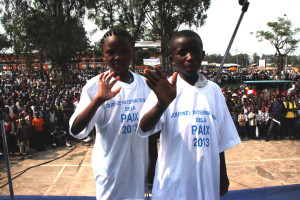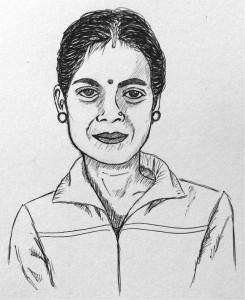By Gabrielle Solanet
Last weekend, Searchers and their partners across the world celebrated International Peace Day. In the Great Lakes of Africa, our local teams used fun activities to mobilize the masses and spread key messages of peace that transcended borders.
The Great Lakes have suffered from profound violence, particularly since the M23 insurgency took control of key areas in the Eastern Democratic Republic of Congo in 2012, reviving diplomatic tensions between the DRC and its neighbor, Rwanda, and causing the death and displacement of thousands of Congolese civilians. Against this backdrop, Search engaged local citizens into a series of activities aimed at promoting peace and social cohesion in communities across the region.
In the DRC:
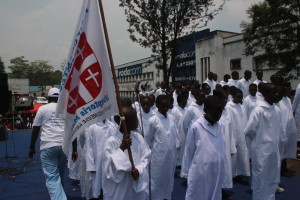
The Search North Kivu team organized a peace marathon across the city of Goma, conveying hope and peace to the population. Four hundred runners supported the cause. Marathoners held banners that read “Respect, Tolerance and Justice – My Combat for Peace”. Goma’s population cheered for them all along their route. Following the race, 3,000 community members attended peace concerts. Popular Congolese artists entertained the crowd, unified under the message: “I personally commit to peace, what about you?”
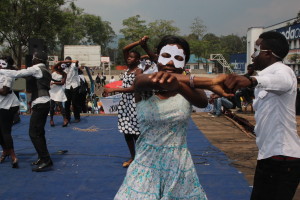 Parallel to the concerts, Search organized a “Seat Ball” Paralympics match where people with physical disabilities from Goma and Gisenyi (in neighboring Rwanda) competed against each other. Altogether, the marathon, concerts and Paralympics created social cohesion amongst divided populations.
Parallel to the concerts, Search organized a “Seat Ball” Paralympics match where people with physical disabilities from Goma and Gisenyi (in neighboring Rwanda) competed against each other. Altogether, the marathon, concerts and Paralympics created social cohesion amongst divided populations.
“Today is the most beautiful day of my life in the past 20 years,” Jean-Robert N’Senga, Coordinator of CIVIS CONGO, a local civic rights association.
The Kivu team also brought several international and local NGOs together to celebrate in the festivities, including Goma’s Youth Cultural Center, the Youth Movement for Change, International Alert, the United Nations’ Refugee Agency and many others.
“Today’s initiatives demonstrated the victory of courage over fear and of unity over exclusion. Peace is a long and challenging process, but it is by taking steps forward, like today, that this dream of peace will one day become a reality,”Vianney Bisimwa, Peace & Reconciliation Officer at SFCG-Goma.
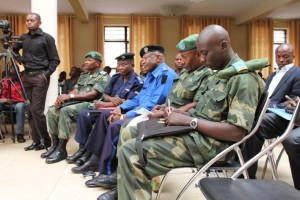 Meanwhile, in South Kivu Search organized a public radio and TV debate, revealing how people can positively bring peace to the DRC and support its democratic institutions. The debate triggered an open dialogue between university students, military and police officers, Congolese civil society organizations, representatives from the Governorate of South Kivu, and the UN Mission to the DR Congo. It will broadcast on the Congolese
Meanwhile, in South Kivu Search organized a public radio and TV debate, revealing how people can positively bring peace to the DRC and support its democratic institutions. The debate triggered an open dialogue between university students, military and police officers, Congolese civil society organizations, representatives from the Governorate of South Kivu, and the UN Mission to the DR Congo. It will broadcast on the Congolese
National Radio Television Channel, the North and South Kivu Radio Television Channel, and TV Vision SHALA throughout the entire month of October 2013.
In Burundi:
Search mobilized 700 Burundian youth across dividing lines in a big march for peace across the capital, Bujumbura. The march 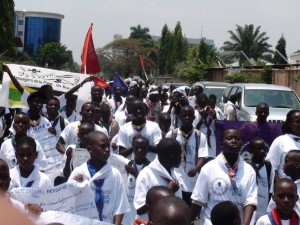 engaged youth from scouts’ movements, civil society, political parties’ youth wings, and representatives from the Burundian Ministry of Youth. The march passed through symbolic places in Bujumbura’s city center, finishing at the scouts’ headquarters. There the youth participated in peace-themed games, poems, and theater competitions. The activity received vast media coverage from national TV and radio stations, bringing together media from different editorial lines to cover the event.
engaged youth from scouts’ movements, civil society, political parties’ youth wings, and representatives from the Burundian Ministry of Youth. The march passed through symbolic places in Bujumbura’s city center, finishing at the scouts’ headquarters. There the youth participated in peace-themed games, poems, and theater competitions. The activity received vast media coverage from national TV and radio stations, bringing together media from different editorial lines to cover the event.
In Rwanda:
Search in Rwanda produced three radio spots for peace. The first spot asked Rwandan celebrities (musicians, actors, and religious leaders) the question: “What does peace mean to you?” The second spot asked ordinary people to describe “what other people do for you to favor peace.” While the third spot focused on peaceful collaboration with the core message: “one’s neighbor is also a brother.” The three spots are currently being broadcast on four community radio stations and two national radio stations. In addition to the radio spots, SFCG: Rwanda also supported peace efforts led by the Rwandan government’s National Unity and Reconciliation Commission to celebrate International Peace Day by providing t-shirts to the participants in the different activities organized across Kigali’s universities.
At the regional level:
Search’s regional live youth radio program Generation Great Lakes dedicated its Saturday show to International Peace Day. Journalists based in DRC, Rwanda, and Burundi covered all of these peace events live, and they aired simultaneously on our partner radio stations across the three countries. Youth from the region heard how their peers across the border mobilized for peace, shared the obstacles that they encountered, identified together possible solutions towards regional peace, and defined the role of youth in this process.
“Congolese, Rwandan and Burundian populations should look first at what unifies them, not what divides them,” GGL listener from Kigali, Rwanda
______________________
Gabrielle Solanet is a Regional Project Coordinator with Search for Common Ground. Based out of Brussels, she coordinates two regional projects in the Great Lakes’ region of Africa and one project in Ethiopia
By Wassy Kambale
“I really liked this story. I read the whole comic book and I learned that it is important to stay united to better develop,” says Messo. This father of eleven children is the Chief of the village Kalawa Messo.
By the Congo River, in a village in Katanga in the Democratic Republic of the Congo, this traditional leader shares with me what he learned from the comic book distributed by Search.
It tells the story of Nsimire, a woman who convinces her husband Mushaga to allow their daughter Mado to go to school instead of being given away in an early marriage. Mado and Nsimire then go on to play major roles in the development of the village.
Messo Kene Kene recieved the “Mopila” comic book thanks to a team of the Tuungane Program, a program implemented by IRC, Search’s partner that seeks to strengthen good governance by working with local populations. This comic book was conceived as a tool to raise awareness for the program.
To reach this village, I had to walk along a long dusty path, cross a few rivers, go down a ravine and back up a hill. Only ten hay houses sit parallel to a line of mango trees.
Some children are playing with a ball made of used plastic bags. Three women are sitting on the floor braiding mats. Further away, in a little church with no roof, we can see a few young people beating pieces of wood on a thick tree trunk, while singing local songs.
The village chief got off his old bicycle to take me to his house, a hay house just a little bit bigger than the other ones. I try to wipe a few drops of sweat from my forehead, the result of a long walk under the beating sun. “I really admire the Centre Lokolé,” (the name of Search in DRC which more easily pronounced here than Search for Common Ground). Within a few minutes, the old wise men of the village surround me with their curious looks as I introduce myself: “I work for the Centre Lokolé, in the Tuungane program.”
Visibly, everyone has heard of the Centre Lokolé and of the Tuungane program. Later, I learn from Chief Messo that this is the result of the distribution of comic books in the village, as well as, the broadcast of shows on two local radio stations that are situated ten kilometers away. Search supports those two community radio stations in the territory of Kongolo and encourages them to produce shows on good governance. These shows are followed in villages in the area, including the village of Kalawa Messo.
This village is particularly known for its mysterious hills called the “doors of hell”. In legends, these are stone hills are the temple of the most powerful god of the region, god Nyange. “Our god is very powerful. There are people who came here and obtained great responsibilities in the country,” proudly explains chief Messo. He is the one who holds the secret. According to the village legend, no one can meet god Nyange without first seeing chief Messo.
Despite his absolute and almost divine power, Chief Messo says he changed his perception of women thanks to the Tuungane program. “We learned to give a voice to women. Now they are included in the village development committee, where the big decisions are taken, like the rehabilitation of roads, or the construction of the village school,” says Messo, before leading me on a free tour of the “doors of hell”.
I walk along another dusty path with him and two other village youngsters. A light wind blows and sometimes lifts a few leaves from the ground. The sun is nearing the horizon to remind us that it is nearly the end of the day. Twenty minutes later, the noise of the Congo River waters reach my ears and chief Messo tells me that we have nearly reached our destination and that I should not forget to support his villagers.
For him, the comic book educates and should be available to the populations of even the most unreachable villages. “I would have like that the people of my village receive every publication of the Mopila comic book series. Everyone loves those comic books here.”
In front of me lay the Congo waters that prevent me from reaching this god, an imposing stone island that splits the waters of the river in front of me.
I take a moment and proudly consider what we achieve through our work here, and the changes I see right before my eyes.
To learn more about our comic books in the DRC, click here.
______________________________
Wassy Kambale is native-born Congolese. He is currently the Tuungane Program Assistant for Search for Common Ground: Democratic Republic of Congo.
By The SFCG Lebanon Team
What’s the first thing that comes to your mind when video games such as Call of Duty, Bullet Storm and MadWorld are mentioned? Most people would probably say violence, guns and conflict.
Search is looking to change all of that.
At Search, we are always looking for innovative ways to promote conflict transformation and peacebuilding. We know from experience that popular culture is a powerful way of conveying messages such as acceptance of the “other” and tolerance without causing people to lose interest.
Our aim with our new video game, Cedaria: Blackout, is to provide the youth in the Middle East a platform to learn and practice how to mediate conflict, solve community problems collaboratively, and understand the perspectives of the “other”.
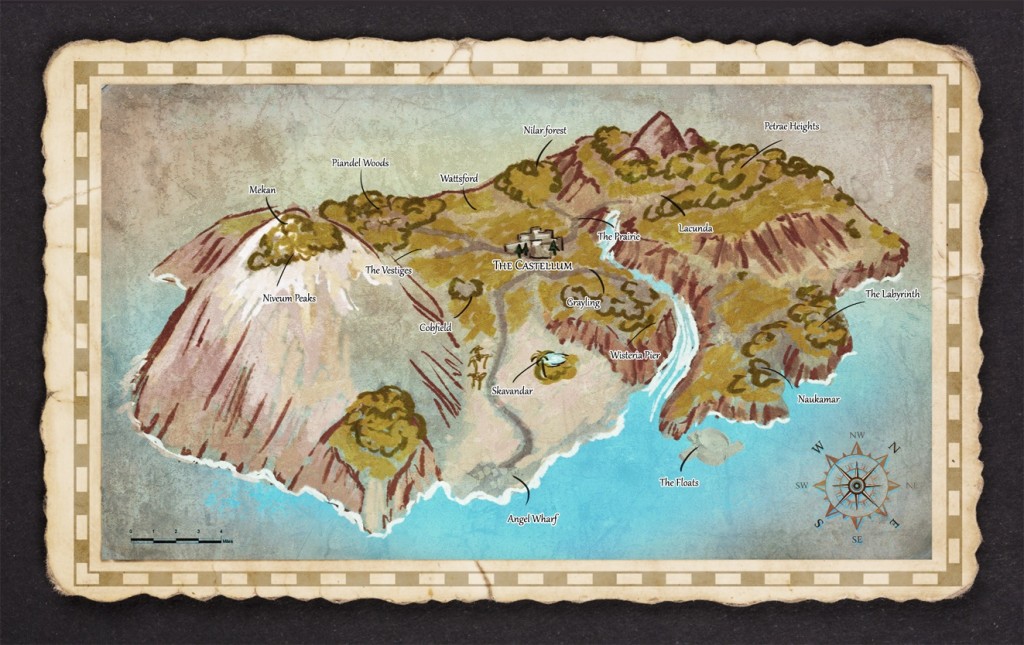
At a time of escalating violence in the region, we believe that gaming is an effective and innovative tool to reach out to young people and promote non-violent behavior without being boring or patronizing.
This idea is supported by studies showing that skills learned while playing video games are transferable to real life situations. If in a virtual world players can explore options that go beyond socially accepted norms, they will be more inclined to replicate similar behaviors in their everyday life.
Lebanon and the Middle East
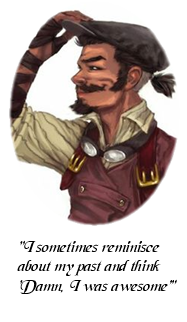
Living in the Middle East, one can’t help but wonder why there aren’t more initiatives similar to this one. People of all ages own smartphones and use them to play video games. A colleague once mentioned that during the civil war, he and his cousins were spending time playing video games and this became their most lasting memory from that period of their life. That’s when we knew we had to turn our idea into reality!
With traditional peacebuilding activities we tend to focus on the same target group, but a video game would allow us to reach a new audience. In the pre-production process, we
conducted a survey that highlighted how Lebanese youth spend several hours every day playing video games, reinforcing the notion that video games can be effective in youths’ daily lives. Video games also allow people from different backgrounds and sectarian groups to interact.
As a peacebuilding organization our expertise in creating a video game was limited. In order to make sure we could develop a truly entertaining video game, we teamed up with highly innovative game developers. Some of them had worked on violent games such as Assassin’s Creed and Far Cry, but found our project a breath of fresh air.
So what does it look like?
 We wanted to ensure that the game was both educational and entertaining. We did so by combining:
We wanted to ensure that the game was both educational and entertaining. We did so by combining:
- Dialogue designed with the constant feedback of our very own conflict resolution specialists to ensure we teach youth the necessary skills through experience and practice
- Game scenarios giving players the freedom to choose between cooperative and non-cooperative behavior in which they experience the consequences of their choices.
- Steampunk style that gives the characters an edgy look and allows us to explore certain dynamics that are characteristic of the Middle East without breaking the “suspension of disbelief.”
- Middle Eastern elements so that the players can identify with the game setting.
How to help us!
Search received funding from the Royal Netherlands Embassy in Beirut to develop the video game. However, in order to complete the game in line with the original vision we need additional funding. To this end we launched a crowd funding campaign on Kickstarter.
If you want to help us with this INNOVATIVE project in the Middle East you can do so by:
1. Donating to our project. It’s really simple:
- Go to Kickstarter.
- Click on “BACK THIS PROJECT” and register your profile.
- Choose the amount of your donation.
2. Helping us spread the word!
- Like our Facebook page and share it with your friends.
- Follow us on Twitter and tweet us to your followers.
- Watch us on YouTube.
- Read on our blog for updates.
__________________________________________________
SFCG Lebanon team believes that entertaining tools are the best way to engage youth for peace. They have implementing projects with youth in Lebanon since 2008 already producing two TV series to spread messages of tolerance and acceptance of “the other” while promoting a united Lebanese identity beyond sectarian lines.
By Jessica Murrey
Between the violence in Syria and Egypt, the mass shootings in the US, the 1 in 3 women that face sexually based violence worldwide– we have to do more to end violence.
We can no longer afford to sit in the shadows and have peace be a wistful yearning of our hearts or sweet prayer on our lips. Peace isn’t something you just wish for– it’s something you wage. In honor of International Peace Day, Search and our friends from across the globe are taking action for peace, finding constructive solutions to the problems that plague us.
We are making the choice, in our daily lives, to respond with understanding, patience, and thoughtfulness to our conflicts. We are choosing to forgive instead of retaliate. To count to ten instead of erupting in anger. To humanize each other instead of demonize. We are choosing to start the change within ourselves with the aim of changing the world.
So join us! Tell us where you wage peace by using the hashtag #WagePeace! Whether it is in your relationships or in your country, share where you #WagePeace on Twitter, Facebook and Instagram. If you want to make sure we see it, tag us on Facebook (Search for Common Ground) or use our handle for Twitter and Instagram: @SFCG_.
For more photos and fun, check out our Facebook page, click here!
_________________________________________
Jessica Murrey believes media is powerful tool in changing the world for the better. She studied journalism and international relations at the University of Nevada Las Vegas and worked in broadcast television, forming messages of awareness and prevention against domestic, drug and child abuse. She is currently the new media coordinator at SFCG.
By Jiyoung Han
Sanju Kumari Das is a petite, soft-spoken woman, but don’t let that fool you. Hailing from Siraha, a volatile district in Nepal’s eastern Terai, this formidable 26 year-old commands the attention of political giants, helps end nationwide strikes, and is one only a handful of female radio show hosts in Nepal.
Sanju is a producer for the Farakilo Dharti franchise, one of Search’s peacebuilding radio talk shows in Nepal. While some talk shows hook listeners by inciting fights between guests, this weekly half-hour program does exactly the opposite; it promotes a culture of collaboration and reconciliation by holding solution-oriented dialogues between conflicting parties. Sanju has undergone Search’s peacebuilding training and applies the common ground approach to disputes on the program.
“It’s challenging to get people of opposing sides to come to an agreement, but it’s truly rewarding when it happens,” explains Sanju. “Agreement is difficult to achieve and should be celebrated.”
In hosting Khulla Dharti—the Maithili language version of the show—Sanju mediates clashes from high-level national politics down to local school affairs. While she doesn’t exaggerate the program’s impact—“one episode isn’t going to change everything”—she can recite an impressive list of resolutions between her guests. Once when political parties enforced nationwide strikes over a disagreement on the future federal states, Sanju invited party reps on the show to talk it out. This set a constructive precedent for subsequent talks, culminating in a multi-party agreement to end the strikes.
Many of Sanju’s guests have praised her accomplishments and mediation skills. This is all the more striking in a region where women are expected to be silent before men, contrary to Sanju’s highly public profile as a peacemaker. However, Sanju believes her gender and youth are irrelevant to the quality of the show, however. She coolly explains that, as long as the proper conflict resolution models are maintained, hosts young and old, male and female, would see similar results.
“I used to think I was always right, that my opinions were the most accurate. But producing Khulla Dharti has shown me that I make mistakes, that alternative views have just as much merit as my own. I’ve learned to listen to others, which is a crucial part of resolving any conflict.”
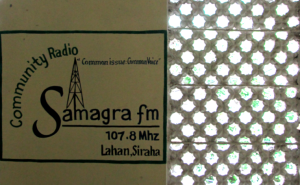
Sanju’s Khulla Dharti broadcasts via Radio Samagra, one of SFCG’s main local partners in southeast Nepal
Khulla Dharti has built a strong following, with listenership as high as 41% of all radio listeners in the eastern region of Nepal. Sanju credits the program’s emphasis on neutrality and constructive dialogue as the key to its appeal. Whether it’s critically or appreciatively, listeners are engaging with Khulla Dharti conversations. For now, they’re focused on getting Sanju back on air; the mother of two has been on maternity leave to look after her 8 month-old son. She plans on returning to Khulla Dharti soon.
Fourteen radio stations currently produce and broadcast Farakilo Dharti in three languages—Nepali (Farakilo Dharti), Maithili (Khulla Dharti), and Tharu (Chakkar Dharti)—tailoring their respective shows to the local context. Between April and June of 2013, 84% of FD episodes have led to an agreed solution between conflicting parties, while a 2013 listenership survey revealed that 80% of respondents continue the discussion with friends after listening to the show. Indeed, FD continues to have impact on its target communities, with marginalized groups across the country reporting that it gives their voices an otherwise unavailable platform.
Connect with Farakilo Dharti on the Web and on Facebook. All FD episodes are uploaded onto the website on a weekly basis and are available to any interested listener.
For more information contact Yubakar Rajkarnikar, Media Manager, SFCG Nepal | [email protected]
_________________________
Jiyoung Han was an intern for Search for Common Ground Nepal.
By : Whitney Skippings
“Generation Great Lakes opened my eyes, gave me a more positive vision on the role of the media involving Rwandan, Burundian, and Congolese youth in the reconstruction of their respective societies and across borders. Long live GGL!”
-Facebook commenter
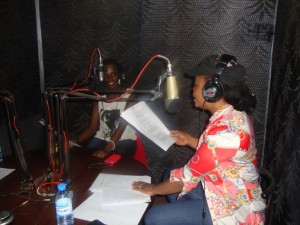 August 10th marked the 100th episode of Génération Grands Lacs (GGL), which producers used as an opportunity to recap the radio show’s greatest successes and flops. A multilingual broadcast in Rwanda, Burundi, and the Democratic Republic of the Congo, GGL manages to reach tens of thousands— if not millions— of listeners in the region.
August 10th marked the 100th episode of Génération Grands Lacs (GGL), which producers used as an opportunity to recap the radio show’s greatest successes and flops. A multilingual broadcast in Rwanda, Burundi, and the Democratic Republic of the Congo, GGL manages to reach tens of thousands— if not millions— of listeners in the region.
This project specifically targets the quickly growing youth demographic in the region, fostering camaraderie and understanding across borders through discussion and debate. According to the National Youth Policy of Rwanda, over 65% of the Rwandan population is under 25 years old, implying that long-term peace in the region largely depend on mutual understanding of this age group. Rwanda’s youth boom is part of a larger trend in East Africa, where over 80% of the regional population is categorized as a “child or youth.” GGL launched in 2006 with this in mind. It provides an outlet for these future regional leaders, allowing their active participation in the show.
While text, phone calls, and email are a large part of audience contributions, social media is also integrated into GGL’s programming. An extraordinarily active Facebook page accompanies the radio show, where discussion topics build anticipation for the upcoming broadcast. Each week the production team posts the theme for the upcoming program, and listeners from across the region and the diaspora post their thoughts.
Over the last few years, broadcasts have tackled subjects such as arbitrary arrests, prostitution, drug trafficking, and other cross-cutting issues in the region, but the 100th episode took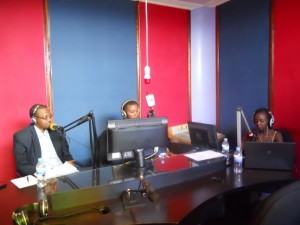 an introspective route. Instead of the usual provocative debates, this broadcast sought the listeners’ views about what part of the GGL programming meant the most to them.
an introspective route. Instead of the usual provocative debates, this broadcast sought the listeners’ views about what part of the GGL programming meant the most to them.
On the Facebook group, listeners responded to the 100th broadcast status with many messages of thanks and encouragement, reinforcing the impact that GGL has on its target audience. One follower responded:
“Once again I say thank you for helping us better understand society outside our own in the DRC, Burundi, and Rwanda….”
Another commenter took the time to praise GGL:
“Time passes quickly; when I listened to GGL on Contact FM Kigali, I never thought that someday GGL would reach its 100th edition. I truly lack the words for the brave initiators of this program.”
Overall, the sentiment is overwhelmingly positive, crediting GGL with helping its listeners better comprehend the livelihoods of those beyond their borders. It is already clear that in the first 100 episodes, GGL has managed to shift the mentalities of its audience.
As a Masters student of International Security, initiatives such as GGL provide me with an opportunity to observe how the media can facilitate sustainable peace. GGL illustrates the effect that sensitive programming can have on an otherwise tense population. While it has not completely eliminated what are sometimes longstanding hatreds between parities, it makes significant strides in cultivating regional understanding. `
The Facebook page provides weekly directions for how to listen to GGL radio show. For those interested in listening to the program over the Internet, it is broadcast by these SFCG partners: www.isangostar.org, www.isanganiro.org, www.groupelavenir.cd, and www.mishapivoicetv.net
_________________________________________
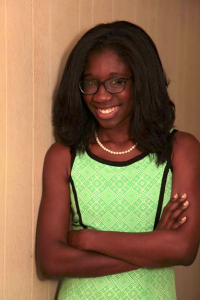 Born and raised in Silver Spring, Maryland, Whitney Skippings is a Regional Intern for SFCG, based in Kigali, Rwanda. She holds Bachelors degrees in Philosophy and International Studies from Spelman College. Currently, she is trudging her way through Georgetown University’s Security Studies Program with a concentration in terrorism and substate violence. This is her second foray in the region, after studying abroad in Kigali, and Gulu, Northern Uganda.
Born and raised in Silver Spring, Maryland, Whitney Skippings is a Regional Intern for SFCG, based in Kigali, Rwanda. She holds Bachelors degrees in Philosophy and International Studies from Spelman College. Currently, she is trudging her way through Georgetown University’s Security Studies Program with a concentration in terrorism and substate violence. This is her second foray in the region, after studying abroad in Kigali, and Gulu, Northern Uganda.

